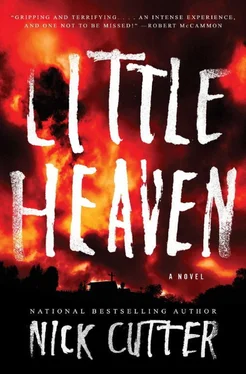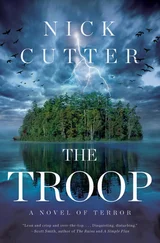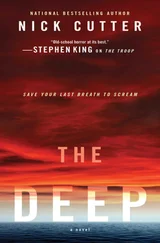He grabbed a Beretta 12-gauge pistol-grip shotgun and ten boxes of shells. To this he added a pair of Colt M1911s, a hundred rounds of ammo, and six spare clips. He stashed everything in the car trunk, then went back inside. He shed his shirt and pants. His chest and arms were cut, but apart from his ear the damage was superficial. He donned a camouflage hunting outfit he found in the main showroom.
Then he went back for the flamethrower he’d pointed out to Micah when they had first come into the shop. He hefted the canisters. Something sloshed inside the left one—jellied gasoline. The right one would be full of nitrogen propellant.
He found a few other items—a bowie knife, a flare gun, some stout rope, and a Zippo lighter in a desk in Jimmy’s office. The lighter sat next to some cigars. Once he identified them as genuine Cubanos and not the trick exploding kind, he slid two of them into the chest pocket of his spiffy new hunting outfit.
He muscled the flamethrower into the Oldsmobile’s backseat. He considered leaving a note for Jimmy, telling him his store had been looted by the forces of good… but he did not do this, because he was not an especially good person and felt no compulsion to lie about it. He did close the back door. The least he could do.
Ebenezer followed the highway until he found a deserted access road. He drove a mile down it and stopped. He opened the trunk, loaded the guns and the spare clips. A scorpion sunned itself on a flat rock nearby.
He got into the car and drove back to the head of the access road. A big store sat on the side of an otherwise deserted stretch a few hundred yards off. Big Al’s Bargain Village. He swung into its parking lot. The dusty bay window showcased the store’s wares. Blenders and fondue pots and tennis rackets and sterling silver tea sets— Al’s got everything under the sun! the display boasted.
A seventeen-inch Magnavox TV was broadcasting an episode of The Andy Griffith Show . Bug-eyed Barney Fife was giving Opie advice. Someone was always giving Opie advice. The carrot-topped, weedy idiot. Eb closed his eyes and rested his head against the glass. Are you really going to do this? he asked himself. Are you that much of a damned fool? He pictured those monstrosities skulking through the woods; he recalled the charnel stink wafting off the one that had swooped down and aggressively relieved him of half his ear.
He didn’t owe any of them a Christly thing. It had been a business arrangement, nothing more. He’d fulfilled his end of the bargain, hadn’t he?
“Can I help you, fella?”
A fat man in a seersucker suit stared at him from the store entrance. Big Al his own self, by the looks of it. He had the flat-hanging, shiny red face of a carnival barker—but he didn’t look all too impressed to see a black man in a camouflage outfit mooning around his display window.
“Just reflecting on life,” Eb said.
“That so, Alec Guinness?” Big Al bit his thumbnail; his teeth crunched on the calcified enamel. “Does that reflection include a desire for midquality consumer goods?”
Ebenezer smiled. “I guess not.”
“Then I’ll kindly ask you to fuck right off.”
Ebenezer laughed. “And the horse I rode in on, yes?”
“That’s about the size of it. I don’t need your nose prints all over my glass.”
Still chuckling, Eb walked back to the car. Big Al glared after him. Eb slid behind the wheel and fired up the Olds. “Eve of Destruction” was playing on the radio. He cranked the volume knob and peeled out of the lot, heading back in the direction he’d come.
DARKNESS HAD NEARLY FALLENby the time Minerva and Micah reached the rock. They stopped twenty yards from its southern face. It was black as obsidian. Its outcroppings were sharp as cut glass, impervious to the scourings of wind and rain. Its sheer face climbed nearly two hundred yards before reaching a flat apex. Micah wondered if there was a route to the summit—and, if one existed, did they really want to see what was up there?
They circumnavigated the rock, working eastward. They kept their distance from it, walking through the clingy sand that carpeted the slope. The sun’s dying rays washed the woods, but did not lighten the monolith itself. It was as if the sun’s light was consumed by it.
It took half an hour to cut around to its eastern face. The monolith was carved sharply, its angles nearly as neat as those on a skyscraper. The new face rose even more sheerly: a black mirror that, instead of reflecting, swallowed the reflections of anything set before it.
The sun set behind the firs. The woods were quiet. The only sound came from the rock itself: a low bristling hum, as if, behind its edgeless face, trillions of flies were filling its core with the seethe of their industry.
“This place is terrible,” Minerva said, standing off Micah’s shoulder.
Micah could not disagree. It was dreadful to encounter such spots: places that appeared to have experienced horrors that, while unseen and ages-old, were still trapped there—held there by whatever malignancy had minted them. But there was no visible evidence. No sacrificial altar, no open graves or moldering skulls mounted on pikes. Just the implacable rock and the fearsome chill it gave off.
They came upon an entrance of sorts: an inverted V in the rock face, about twenty feet tall at its apex. Darkness crawled out of it. It gave off a more profound cold, too: Micah’s forearms broke out in gooseflesh. He removed a flashlight from his pack and shone it into the cleft. The beam gave no indication how far in it went or where it might lead.
“Think the kids are in there?” Minerva said. Her voice was tight with strain. “We could keep walking around the whole—”
“This is the place, Minny.”
“Yeah. Feels like it.”
The cleft was five feet wide at its base, but it narrowed quickly; they had to duck to get inside. The cleft gave way to a cavern carved through the rock. The flashlight picked up a scattering of pebbles on its uneven floor. Mineral deposits jagged down from the cavern’s ceiling: they were two feet long, skinny as soda straws. These weird rock icicles. One raked the top of Micah’s scalp like the scrape of an emery board. The rock was wet here, with a popcorny appearance: it resembled a vast exposed brain.
The tunnel was set on a gradual decline, almost too imperceptible to discern. The air was stale with an alkaline undertaste—the taste that comes up off hot pavement after a storm. Micah swept the beam over the walls and ceiling, which was no longer carbuncled but instead perfectly rounded, as if it had been smoothed with a grinder. Their breath filled the cramped space, creating vibrations that flitted against the sensitive apparatus of their inner ears.
A sly squirming noise emanated overhead. Micah stopped. Minerva ran into his back and let out a squawk. He pressed a finger to his lips. The squirming was wet, unctuous, lush . He swung the beam up to the cave ceiling. Minerva dry-heaved in revulsion.
The ceiling was covered in a seething mass. Eelish creatures, each roughly three inches long, carpeted the rock. They were pale yellow, the color of margarine or the fatty tissue of an excised tumor. Their pencil-thin bodies were belled at one end and tipped with a flagellate tail at the other. Thousands of them squirmed on the rock above.
“Olms,” Micah said quietly. “A kind of salamander. They are not native to this part of the world.”
The creatures massed into large balls the size of grapefruits. The balls quivered pendulously, threatening to fall and splat on the floor—or on their upturned faces.
“What the hell are they doing?”
Читать дальше












